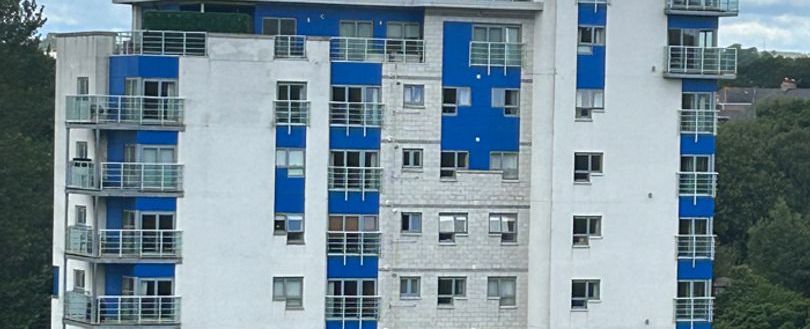
Scotland's first high-rise building with dangerous cladding replaced post-Grenfell
Like it? Share it!
24 July 2024
The Aurora Apartments in Aberdeen have become the first high-rise building in Scotland to have hazardous cladding removed and replaced under a government pilot scheme initiated after the Grenfell tragedy. This milestone marks a significant advancement in ensuring fire safety in residential buildings across the country.
The nine-storey building underwent extensive construction to comply with stringent fire regulations established following the Grenfell Tower fire in London. This included the removal and replacement of combustible wall cladding and insulation materials with non-combustible alternatives, ensuring the building is now much safer in the event of a fire.
The Scottish Government identified the Aurora Apartments as one of several 'high priority' buildings for cladding remediation under the Single Building Assessment (SBA) programme. The project, costing £600,000, was funded by the government and managed by Diamond & Company (Scotland) Ltd Chartered Building Surveyors and Chartered Fire Engineers.
Phil Diamond, Managing Director of Diamond & Company, stated: “The Grenfell fire exposed a systemic failure in all aspects of cladding installation in buildings throughout the UK.
“The completion of the work on the Aurora apartments in Aberdeen now provides an industry blueprint on how to make similar high-rise buildings much less vulnerable in the event of a fire.
“The residents in the Aurora apartments should sleep soundly at night now, knowing their building is much safer.
“The new non-combustible cladding is the highest standard on the market, stopping any fire from spreading over the outside of the building.
“If there was a serious fire in one of the flats it would not be able to spread over the outside of the building because the cladding is non-combustible, meaning there is no energy for the fire to feed off.
“It was an extremely challenging project which involved opening up the building and removing the timber support frame and other combustible materials.
“We used a drone with laser scanning to survey the building, and surrounding area, to help us produce detailed architectural drawings to plan the work required to make the block of flats safer.
“We are now moving ahead with similar projects across Scotland and the rest of the UK and look forward to the completion of other remediation works in the coming years.”
Housing Minister Paul McLennan highlighted the importance of this project, stating: “This is a very important moment for owners and residents and I was pleased to visit Aurora Apartments earlier this month to meet with those involved. The Scottish Government has provided £600,000 funding for the complex and innovative work at this building.
“The remedial work that has been carried out at this site builds on the recent passage of the Cladding Remediation Act which will support our efforts to make buildings safer and to safeguard homeowners and residents across Scotland.”
The legislation banning combustible cladding on new high-rise residential buildings and high-risk buildings above 11 meters (36 feet) was enacted by the Scottish Parliament in April 2022. This was implemented through amendments to the Building (Scotland) Regulations 2004, which came into effect on June 1, 2022. The regulations also apply to recladding works on existing buildings, such as the Aurora Apartments.
The remedial work at Aurora Apartments was conducted by a company in Arbroath. Jacqueline Hacking, Managing Director, remarked: "This was an extremely complex job which involved not only the removal of the outside wall cladding but the replacement of internal materials. We had to strip the building right back to ensure all internal combustible materials were removed. This also included the replacement of the timber decking on balconies with fire-rated aluminium decking. However, thanks to the tremendous cooperation and support of the residents the project was successfully completed. Those in the building can now live in comfort, knowing that the Aurora Apartments meet the new fire regulations launched following the fire at Grenfell Tower."
The developer of the Aurora Apartments had ceased trading, prompting Trinity Factors to act on behalf of the residents. Paula Roberts, Aberdeen branch manager, expressed relief and gratitude for the inclusion of the building in the government’s pilot programme, ensuring the necessary work was funded: "Residents were understandably concerned when the survey work revealed the extent of the combustible materials on the outside and inside of the building. We also had the added complication that the developer of the building ceased trading several years ago, so it was a relief when the Aurora Apartments were included in the Scottish Government’s pilot programme. This provided the residents with some certainty and confirmation that the work would be paid for by the government."
This successful project at the Aurora Apartments sets a precedent for future cladding remediation works across Scotland and the UK, providing a safer living environment for residents in high-rise buildings.
Our eNews provides regular insight into industry trends, news headlines, and product and service information. For more articles like this Subscribe to our enews.
Related training
Related news
-
Record Rise in E-Bike and E-Scooter Fires Across London
28 January 2026
Related resources
-
Fire Risk Assessors Standard Scope of Services
07 August 2025
-
Passenger Service Vehicle - Guidance Note
05 September 2023
